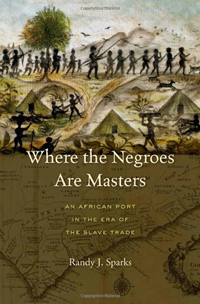Book Notes
 Randy J. Sparks, Where The Negroes Are Masters; An African Port in the Era of the Slave Trade (Cambridge: Harvard University Press, 2014), 309pp.
Randy J. Sparks, Where The Negroes Are Masters; An African Port in the Era of the Slave Trade (Cambridge: Harvard University Press, 2014), 309pp.
By the time the British and Americans declared the slave trade illegal in the early 19th-century, 10 million Africans had been exported to the New World. The largest slave trading depot was a port called Annamaboe, in present day Ghana. Randy Sparks has written a masterly micro-history or "urban biography" of Annamaboe. He documents how the African actors in this story were not all passive pawns, but in remarkable ways powerful agents.
The Fante elite dictated almost all the terms of the slave trade, says Sparks. Traders violated their edicts at their own peril. The Fante were in "full control" of their port and their trade. They were the middlemen between the European slavers and the supply of slaves in the African interior. They fixed the prices. They collected rent, taxes, and tributes. They dictated which Africans could be enslaved, and exacted retribution if a family member was taken. Most of the slaves were prisoners of war. Some were criminals, and still others were kidnapped.
Before the slave trade, Annamaboe was a "sleepy fishing village" that was a net importer of slaves and exporter of gold. That flipped with slavery. Sparks devotes individual chapters to the "absolute master" of the Gold Coast, the African John Corrantee — a combination merchant, magistrate, and military commander who sent his sons to London and Paris for their educations; and Richard Brew, an Irish trader who married Corrantee's daughter and lived permanently at Annamaboe. Together, they exported more slaves than anyone.
There were many more actors — brokers, gold takers, ship captains and their crew members, canoe men, bush traders, health officers who inspected the cargo, clergy, insurance companies, creditors, linguist-translators, suppliers, artisans and crafts people. The plantation economy created a high demand for slaves in America. Rum Runners from Rhode Island established Newport as the most important slave port in North America. It was a lucrative if risky and dangerous business. In Annamaboe it all crashed in a sudden collapse, much to the regret of the Fante, due to the perfect storm of the American Revolution, a devastating war with their rival Asante, and 1807 legislation that made slavery illegal. "Money, and not morality," Thomas Jefferson once said, "is the principle of commerce and commercial nations." (p. 161).


